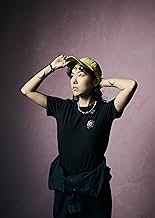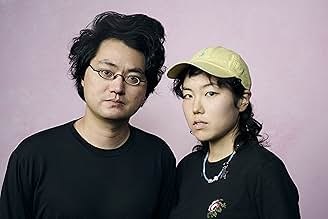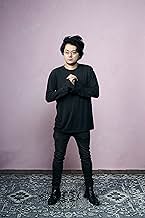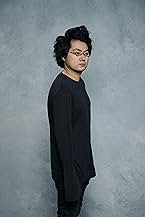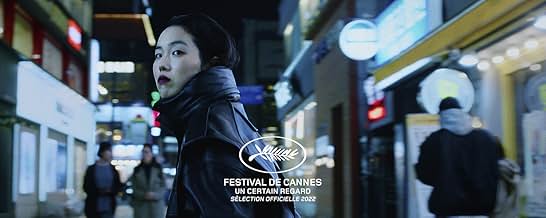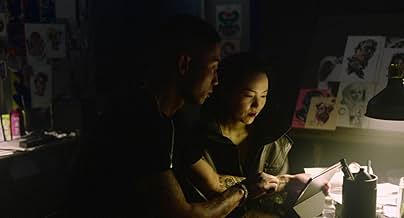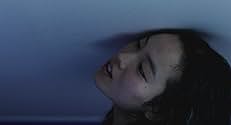Retour à Séoul
- 2022
- Tous publics
- 1h 59min
NOTE IMDb
6,9/10
10 k
MA NOTE
Une Française de vingt-cinq ans revient pour la première fois en Corée, où elle est née avant d'être adoptée par un couple français. Elle décide de retrouver ses parents biologiques, mais so... Tout lireUne Française de vingt-cinq ans revient pour la première fois en Corée, où elle est née avant d'être adoptée par un couple français. Elle décide de retrouver ses parents biologiques, mais son voyage prend une tournure surprenante.Une Française de vingt-cinq ans revient pour la première fois en Corée, où elle est née avant d'être adoptée par un couple français. Elle décide de retrouver ses parents biologiques, mais son voyage prend une tournure surprenante.
- Réalisation
- Scénario
- Casting principal
- Récompenses
- 10 victoires et 25 nominations au total
Heo Jin
- Grandmother
- (as Jin Heo)
Régine Vial
- Gisèle Benoît
- (as Régine Vial Goldberg)
Shin Dong-ho
- Tena's Father
- (as Dong-ho Shin)
Avis à la une
Return to Seoul is an ambitious film, telling the story of a young woman named Freddie, who was born to Korean parents, but grew up in France. She - you guessed it - returns to Seoul, partly motivated to search for them, in her early to mid-20s. From there, the movie plays out sort of the way you'd expect for a while... until it makes some interesting narrative decisions, spanning far more time than I'd expected it would. As such, we get an insight into Freddie and the ways she changes throughout her 20s and into her early 30s.
Tonally, it's very different from The Worst Person in the World, but I got flashes of that film from this; maybe it scratched a similar itch. Each looks at a troubled & flawed, yet interesting, compelling, and sympathetic young protagonist, each spans quite a long period of time, each explores loneliness and the trials and tribulations of early adulthood in a very hard-hitting way, and each is quite visually striking. But like I said, they're tonally different, given Return to Seoul is more of a straightforward drama than a romantic-dramedy, and it gets darker and more in-depth with its exploration of loneliness (which hits extra hard, given what the world's been through since the start of the 2020s).
It's not always clear where the film is going, and some of the decisions it makes are quite jarring (though most work for the story and characters, once the shock wears off). The pacing is quite slow, but the compelling main character, the visually pleasing look of the film, and the amazing acting kept me engaged for almost all of its two-hour runtime. Park Ji-Min gives one of the best performances of 2022, and I was shocked to read this is her first ever movie. A performance like this that's so central makes or breaks this kind of character-focused film, and thankfully, she's up to the task and then some.
This might not be everyone's cup of tea, but I liked it a lot. While it was deliberately-paced, it never lost me, and I found some of the scenes quite moving. It's a very good movie; hopefully it won't go under too many people's radars, as Awards Season ramps up.
Tonally, it's very different from The Worst Person in the World, but I got flashes of that film from this; maybe it scratched a similar itch. Each looks at a troubled & flawed, yet interesting, compelling, and sympathetic young protagonist, each spans quite a long period of time, each explores loneliness and the trials and tribulations of early adulthood in a very hard-hitting way, and each is quite visually striking. But like I said, they're tonally different, given Return to Seoul is more of a straightforward drama than a romantic-dramedy, and it gets darker and more in-depth with its exploration of loneliness (which hits extra hard, given what the world's been through since the start of the 2020s).
It's not always clear where the film is going, and some of the decisions it makes are quite jarring (though most work for the story and characters, once the shock wears off). The pacing is quite slow, but the compelling main character, the visually pleasing look of the film, and the amazing acting kept me engaged for almost all of its two-hour runtime. Park Ji-Min gives one of the best performances of 2022, and I was shocked to read this is her first ever movie. A performance like this that's so central makes or breaks this kind of character-focused film, and thankfully, she's up to the task and then some.
This might not be everyone's cup of tea, but I liked it a lot. While it was deliberately-paced, it never lost me, and I found some of the scenes quite moving. It's a very good movie; hopefully it won't go under too many people's radars, as Awards Season ramps up.
What stands out the most about this film is its refusal to take the easy route. While viewers may think they can predict the direction after the first act, they are mistaken. The narrative defies predictability, mirroring the unpredictable nature of wounded souls and those who never feel truly at home.
The protagonist's actions may seem foolish, but what truly captivates is the striking humanity portrayed with raw realism, making it impossible to abandon the desire and hope for her to find solace within. I was left speechless when I found out that this is Ji-Min Park's debut role. A role that made me shed tears on more than one occasion and that is her merit in making us see so well that everything she is, is the result of her life's circumstances.
The experiende Oh Gwan-rok, in the role of the biological father, is also outstanding, but this is not just a film of performances. It boasts brilliant scenes, expertly paced storytelling, daring technical choices, and a secure, risk-taking direction, all complemented by a flawless soundtrack.
PS: The main theme of this and the one of "Decision to Leave" are two haunting melodies that linger in my mind, compelling me to delve deeper into the history of South Korean music.
The protagonist's actions may seem foolish, but what truly captivates is the striking humanity portrayed with raw realism, making it impossible to abandon the desire and hope for her to find solace within. I was left speechless when I found out that this is Ji-Min Park's debut role. A role that made me shed tears on more than one occasion and that is her merit in making us see so well that everything she is, is the result of her life's circumstances.
The experiende Oh Gwan-rok, in the role of the biological father, is also outstanding, but this is not just a film of performances. It boasts brilliant scenes, expertly paced storytelling, daring technical choices, and a secure, risk-taking direction, all complemented by a flawless soundtrack.
PS: The main theme of this and the one of "Decision to Leave" are two haunting melodies that linger in my mind, compelling me to delve deeper into the history of South Korean music.
I saw this film yesterday and I thought that it's an original and unique film, but somewhat difficult to enjoy. An issue that many people have is that they can't connect to Freddy, the main character, and I get why. Her behaviour is often erratic, and then at times repelling and harsh to others. As she really takes centre stage in this film, it can be hard even for the spectator to put up with her behaviour, even though it is nowhere near outright evil. I thought a bit more about this, and will share my view of it. I won't reveal any detail of the film that you can't find in any generic introduction, so no spoilers, however if you want to watch this and build your own understanding unaffected by my interpretation, you may not want to read on.
I actually know well a person in a similar situation to Freddy, somebody from outside Europe who was adopted to Europe at the age of half a year. There are clear parallels also in behaviour. Being abandoned is a primal experience for adopted children. In these cases an additional thing is that the environment can clearly see that the parents are not the biological parents, and some may think the child "doesn't belong" in the country to where it was adopted. This will add to their experience of being somewhat odd and maybe not really accepted, even though the adoptive parents themselves may not convey anything of that kind. What I see in Freddy is a very strong tendency to keep up and defend her own independence fiercely, particularly if somebody else gets closer. The biological parents have given her away, so it is hard to handle and accept for her if she meets them again and they want some closer contact. I think there is much fear of being abandoned again involved. She may also have tried extra hard to become a proper French person when growing up, potentially facing some prejudice but also encouragement there, and she may identify South Korea as a place that abandoned her, even though there is also curiosity and a certain feeling of connection that she has difficulties allowing for herself. So she develops this rather ambivalent relationship to South Korea and the people there, sometimes behaving extra strange, sometimes getting closer, then again wanting to run away when indeed somebody gets a bit closer. There may also be an element of trying to prove life wrong, trying to show to herself that ultimately she isn't rejected by South Korea and her biological parents, but with a lot of suspicion and self protection at the same time. So thinking about this a bit longer, ultimately her behaviour makes a lot of sense to me, even in its superficial inconsistency.
So after a day I think this is actually very well done and convincing, and I'll give it 8 stars, even though I hadn't felt like that yesterday when the film ended. Note, explanations are not normally given in the film. She does what she does but she really isn't communicative about her motives, so we can only speculate. But it makes all sense to me, given also my personal knowledge of such a person.
I actually know well a person in a similar situation to Freddy, somebody from outside Europe who was adopted to Europe at the age of half a year. There are clear parallels also in behaviour. Being abandoned is a primal experience for adopted children. In these cases an additional thing is that the environment can clearly see that the parents are not the biological parents, and some may think the child "doesn't belong" in the country to where it was adopted. This will add to their experience of being somewhat odd and maybe not really accepted, even though the adoptive parents themselves may not convey anything of that kind. What I see in Freddy is a very strong tendency to keep up and defend her own independence fiercely, particularly if somebody else gets closer. The biological parents have given her away, so it is hard to handle and accept for her if she meets them again and they want some closer contact. I think there is much fear of being abandoned again involved. She may also have tried extra hard to become a proper French person when growing up, potentially facing some prejudice but also encouragement there, and she may identify South Korea as a place that abandoned her, even though there is also curiosity and a certain feeling of connection that she has difficulties allowing for herself. So she develops this rather ambivalent relationship to South Korea and the people there, sometimes behaving extra strange, sometimes getting closer, then again wanting to run away when indeed somebody gets a bit closer. There may also be an element of trying to prove life wrong, trying to show to herself that ultimately she isn't rejected by South Korea and her biological parents, but with a lot of suspicion and self protection at the same time. So thinking about this a bit longer, ultimately her behaviour makes a lot of sense to me, even in its superficial inconsistency.
So after a day I think this is actually very well done and convincing, and I'll give it 8 stars, even though I hadn't felt like that yesterday when the film ended. Note, explanations are not normally given in the film. She does what she does but she really isn't communicative about her motives, so we can only speculate. But it makes all sense to me, given also my personal knowledge of such a person.
I think I may have warmed to this film better had I not taken an instant dislike to "Freddie" (Park Ji-min). Now it's certainly a testament to this actor that she is able to successfully - and pretty immediately - engender a sense that her character is a rather selfish, manipulative and unpleasant individual; but I'm afraid I struggled to remain engaged as her troubled story of adoption and of her re-introduction to her birth family is played out over the next two hours. "Freddie" appears to have been happily brought up by a couple in France, so her increasingly thoughtless behaviour doesn't really have an anchor - and as we progress and she becomes more obnoxious - as exemplified by her final scene in the car with poor old "Maxime" (Yoann Zimmer) - I found the story has just about run out of merit. The acting is generally good. The efforts from her slightly dipso dad (Oh Kwang-rok) is convincing as he has to reconcile the discovery of his long-lost daughter with his dependency on the bottle and her own pretty obvious disdain for the man. It also offers us quite an interesting insight into just how adoptions worked as the decline of the French colonial system in post-war Korea led to many children being offered by parents who hoped that a childhood and education in France would offer greater opportunity, but again with "Freddie" that isn't really developed. What has turned her into this rather objectionable person is rather left aside. It has an element of "be careful what you wish for" to it, and is, at times, an interesting observation on the stresses of the post-adoption processes but I just didn't like or care about her and so my enthusiasm just waned.
As an audience member, films that cover the topic of adoption, there are expected themes of identity involved. But instead we get more of a random style of set-pieces within the conventional moments that represented identity in a unique way.
For the most part, it worked for the character and the story. But there were some that I just couldn't get on board with and some were even so random they were unforgivable.
I really liked Park Ji-Min's performance. I enjoyed the attitude that she gave to the leading character and the spontaneous moments that she orchestrated were largely memorable and one of the strongest parts of the film.
I liked the overall look. It was able to give us some effective imagery in different environments and never feel like different films.
The pacing was gentle. There were some purposeful lingering shots which worked well for the most part. Also, the camerawork was respectful with its wide shots as it let the pictures do the talking instead of taking over and turning it into something that wasn't intended.
As mentioned, I wasn't invested with every decision made. Some of the choices in the narrative in the second half made no sense to me. There were others I appreciated, but just wasn't a fan of them.
Despite that, I thought this was still a good enough drama that was worth my time. It's got a solid leading performance that you're willing to invest in. It also poses some interesting representations on the themes of identity that I've not seen before.
I cannot forgive some of the random moments in the second half. But nevertheless, there was enough engrossing moments to keep me guessing how this would end.
For the most part, it worked for the character and the story. But there were some that I just couldn't get on board with and some were even so random they were unforgivable.
I really liked Park Ji-Min's performance. I enjoyed the attitude that she gave to the leading character and the spontaneous moments that she orchestrated were largely memorable and one of the strongest parts of the film.
I liked the overall look. It was able to give us some effective imagery in different environments and never feel like different films.
The pacing was gentle. There were some purposeful lingering shots which worked well for the most part. Also, the camerawork was respectful with its wide shots as it let the pictures do the talking instead of taking over and turning it into something that wasn't intended.
As mentioned, I wasn't invested with every decision made. Some of the choices in the narrative in the second half made no sense to me. There were others I appreciated, but just wasn't a fan of them.
Despite that, I thought this was still a good enough drama that was worth my time. It's got a solid leading performance that you're willing to invest in. It also poses some interesting representations on the themes of identity that I've not seen before.
I cannot forgive some of the random moments in the second half. But nevertheless, there was enough engrossing moments to keep me guessing how this would end.
Le saviez-vous
- AnecdotesThe movie is based on the life of Laure Badufle, a friend of director Davy Chou. Like Freddie, she was born in South Korea, stayed a year there before being adopted in France. At age 23, she came back and lived for two years there before returning to France. A few years after that, Chou accompanied her to South Korea, when they met her biological father and grandmother. According to him, the meeting was full of emotions, of regret and bad communication, with the translator struggling to convey Badufle's anger into polite Korean.
- Bandes originalesPetals
Written by Shin Jung-Hyun
Performed by Lee Junh-Hwa
Meilleurs choix
Connectez-vous pour évaluer et suivre la liste de favoris afin de recevoir des recommandations personnalisées
- How long is Return to Seoul?Alimenté par Alexa
Détails
- Date de sortie
- Pays d’origine
- Site officiel
- Langues
- Aussi connu sous le nom de
- Return to Seoul
- Lieux de tournage
- Sociétés de production
- Voir plus de crédits d'entreprise sur IMDbPro
Box-office
- Budget
- 2 200 000 € (estimé)
- Montant brut aux États-Unis et au Canada
- 798 774 $US
- Week-end de sortie aux États-Unis et au Canada
- 27 315 $US
- 19 févr. 2023
- Montant brut mondial
- 2 175 376 $US
- Durée1 heure 59 minutes
- Couleur
- Rapport de forme
- 1.85 : 1
Contribuer à cette page
Suggérer une modification ou ajouter du contenu manquant

Lacune principale
What is the Canadian French language plot outline for Retour à Séoul (2022)?
Répondre



